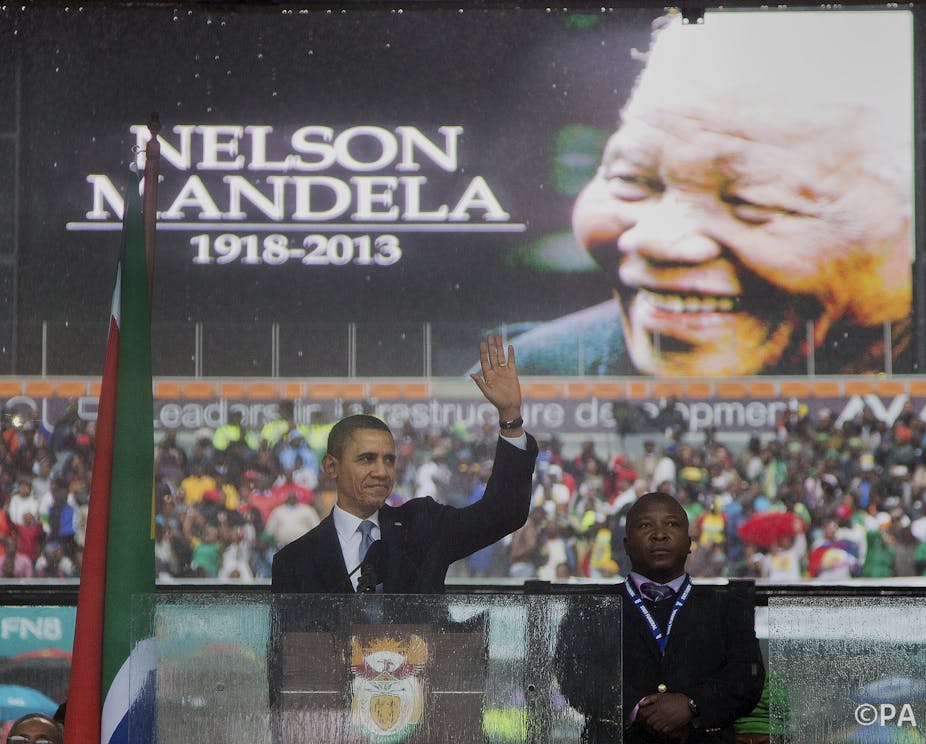South Africa – and the world – has said its formal goodbye to Nelson Mandela. It was a celebration of a life gloriously lived, an event that united us as a global family.
Earlier this year, I reflected on some of the divisive family politics that were threatening (even before Mandela’s actual death) to explode that unity. We know now that Mandela will be buried this Sunday in Qunu, his beloved childhood home and also the location of his rural retirement residence. However, until July this year it was unclear where Mandela’s final resting place would be.
At the centre of an increasingly acrimonious family dispute over the location of Mandela’s eventual grave site lie the bodies of his own three children, who died in 1947, 1969 and 2005. Originally buried in Qunu, the three deceased were removed in 2011 and reburied in Mvezo, Mandela’s birthplace. These days it is the home of his grandson and eldest surviving male heir, the Thembu chieftain and member of parliament, Mandla Mandela.
Although Mandla’s role in organising these exhumations and reburials attracted little attention at the time, he has since become vilified from within the Mandela family as well as by the local media. His critics say he is a predator keen to engineer the location of his grandfather’s gravesite (the logic being Nelson Mandela would never wish to be buried separated from his children) in order to “cash in” on the inevitable future influx of Mandela pilgrims and tourists alike.
This summer, Mandela’s rapidly declining health forced a very public resolution of this domestic dispute. Sixteen members of his family, led by his eldest daughter Makaziwe, were granted a court injunction ordering the immediate return of the three deceased children back to Qunu. Makaziwe and others stated Mandla had “unlawfully violated” the graves of the three deceased for financial gain, citing Mandla’s construction of a memorial site in Mvezo as proof of his ulterior motivations.
That the dispute involved Nelson Mandela’s not-yet-dead body as well as the remains of three of his children only heightened the sense of unease many felt over the manner in which this conflict played out. Even Archibishop Emeritus Desmond Tutu threw himself into the fray, imploring Mandela’s family to desist in their very public feuding: “Please, please, please may we think not only of ourselves? It’s almost like spitting in Madiba’s face.”
Mortuary politics
Yet I think it’s important to resist the tendency, shown by local and foreign press, to characterise and condemn this affair as an unsavoury and best forgotten chapter in Nelson Mandela’s life and times. History tells us that in South Africa “mortuary politics” has been both a defining and dynamic force.
Indeed, one of the first causes taken up by the young lawyer and activist Mahatma Gandhi in his years in South Africa concerned funeral arrangements. The lack of cremation facilities available to the Indian population to properly dispose of the dead in accordance with Hindu practices became the focus of his campaign, and his careful advocacy enabled the building of Johannesburg’s first crematorium in 1918.

During the latter decades of apartheid, the funerals of anti-apartheid activists became key flashpoints of protests and helped galvanise the struggle. The massive popular response to the death in detention of Black Consciousness leader Steve Biko in 1977 is perhaps the best-known example, although even small scale funerals for lesser-known figures could catalyse protests on a local level (particularly in urban townships).
The exhumation and re-burial of politically potent bodies also has a history in South Africa. In 1989, while Mandela still languished in a prison cell, the ANC orchestrated the exhumation and re-burial of Sabata Dalindyebo, former chief of the Thembu tribe. Consigned three years previously to the ignominy of a burial in the female section of a pauper’s grave, Dalindyebo’s ceremonial reburial with full ANC regalia ensured his rehabilitation as a leader in the anti-apartheid struggle and rightful head of the Thembu people.
Saartjie Baartman, a black South African slave exhibited round 19th century European freak shows as the “Hottentot Venus”, provides another example. When her remains were repatriated in 2002, a fledgling democracy was able to transform Baartman from her position as a voiceless subject to an icon of indigenous identity and anti-colonial resistance.
Even among ordinary black South Africans, mortuary politics has become an increasingly important way to express – and assert – belonging and identity. Exhumations, for example, are on the rise in post-apartheid South Africa. Often, the deceased are relocated from an urban township cemetery to the deceased’s family’s homestead in the rural areas. Such reburials have enabled people, even after death, to reclaim their “rural” identity – recognised as the source of “traditional” ethnic authority.
This dynamic is in tune with the sharpening of ethnic allegiances in the country in recent years, controversially exemplified in South African president, Jacob Zuma’s public embrace of his Zulu language and heritage during his rape trial in 2006. Exhumations have also helped families redress in a very personal way the indignities of apartheid, by removing the long shadow of humiliation typically cast by burials in poorly serviced and segregated urban cemeteries.
We should see the struggles over Mandela’s body as familiar and even ordinary. Death and politics have always been intimate bedfellows in South African history. In the post-apartheid period the power of this relationship can be seen in the complex ways South Africans choose to bury, and re-bury, their dead.
In the end, conflict in death is often about what matters most to us in life: identity, belonging, a sense of place, and a semblance of moral order. After Mandela, and with the 20th anniversary of democracy approaching, the search for these elusive qualities will define the course of the nation.
So let us see what this week of mourning and waiting brings. The stakes cannot be higher.

